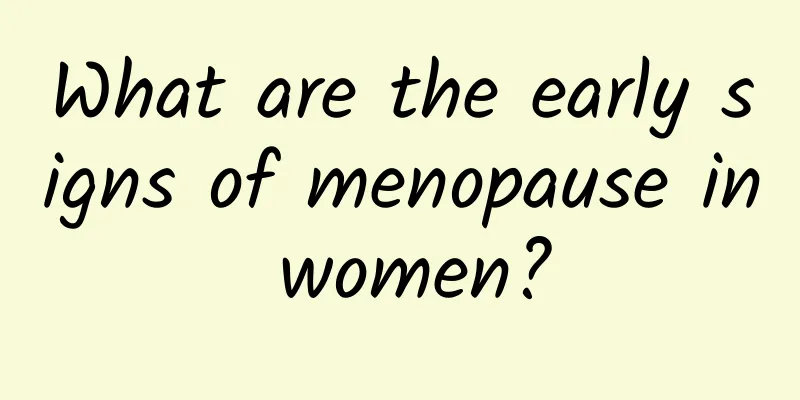What are the early signs of menopause in women?

|
Generally, after the age of 30, women’s ovarian function begins to decline and shrink, the follicles absorb insufficient nutrition, mature slowly, and the secretion of estrogen and progesterone gradually decreases. The endometrium cannot thicken and shed on time, and menstruation naturally cannot come on time. At this time, women are getting closer to menopause. (1) Too little menstrual flow The most common reason is the absence of ovulation. The absence of ovulation most often occurs in the first year of menstruation, in the few years before menstruation stops, and when there is too much stress. Usually, timely adjustment, stress relief, and a good mood can improve and restore normal menstruation. The reason for too little menstrual flow is endometrial adhesion. Although ovulation occurs, the endometrium cannot form, so the menstrual flow is of course very little. (2) Abnormal menstrual cycle The most common reason for menstrual cycles to be too frequent or too long is that the follicles cannot mature normally, resulting in abnormal ovulation. If the follicles are immature and there is no ovulation, there will be no "corpus luteum", and the estrogen and progesterone secreted by the ovaries will not fully regulate the endometrium. When the endometrium is too thick, it will show unstable exfoliation, abnormal menstrual cycles, and abnormal volume. This kind of menstruation without ovulation usually lasts for a long time, and the endometrium is not exfoliated cleanly. Over a long period of time, there is a risk of endometrial cancer. (3) Excessive menstrual flow If you have large blood clots, your clothes and bed sheets are often soiled, you have to use extra-large sanitary napkins, and you feel dizzy, it means you have too much menstrual blood. If you don't ovulate, and your menstrual flow is too little or it hasn't come for too long, the endometrium will not be completely shed, so it becomes very thick and unstable, and when it sheds, it will form a large amount of menstrual blood. If you bleed a lot in an instant, your body will definitely not be able to support it, and you may faint, which is very dangerous. |
<<: Understanding the cause of amenorrhea is more helpful for diagnosis
>>: What are the causes and classifications of amenorrhea?
Recommend
What are the symptoms of vaginitis?
Vaginitis is a common gynecological infectious di...
What are the symptoms of endometritis?
What are the symptoms of endometritis? Is endomet...
What causes irregular menstruation?
Many female friends do not care much about irregu...
What auxiliary examinations are needed for women with amenorrhea
Amenorrhea is a gynecological disease that many w...
Eat potato chips and French fries with this sauce and you will get thinner? Nutritionist: Only by doing these things can you truly get rid of calories
During the long vacation, you probably ate a lot ...
Polycystic ovary disease can lead to infertility. Eat less eggs in a smart diet.
Eggs are rich in nutritional value and are one of...
Is curettage equivalent to having another abortion?
Is curettage equivalent to having another abortio...
How to check pregnancy at 32 days
Pregnancy can be confirmed at 32 days through blo...
Experts introduce the symptoms of female menopausal syndrome
Menopause is a physiological process that every w...
How much does dysmenorrhea surgery cost for women?
How much does it cost for female dysmenorrhea sur...
What are the more effective preventive measures for vaginitis?
Vaginitis is very harmful to women. Many people i...
Is menopausal irregular menstruation common? 7 causes of menopausal irregular menstruation
1. First of all, it is necessary to confirm wheth...
What symptoms will occur after suffering from chronic cervicitis?
Chronic cervicitis is a type of cervicitis. Chron...
Precautions for medications for hyperprolactinemia
For every patient, how to treat the disease is a ...
Detailed analysis of the five major symptoms of uterine fibroids
Uterine fibroids are a type of benign tumor in wo...









